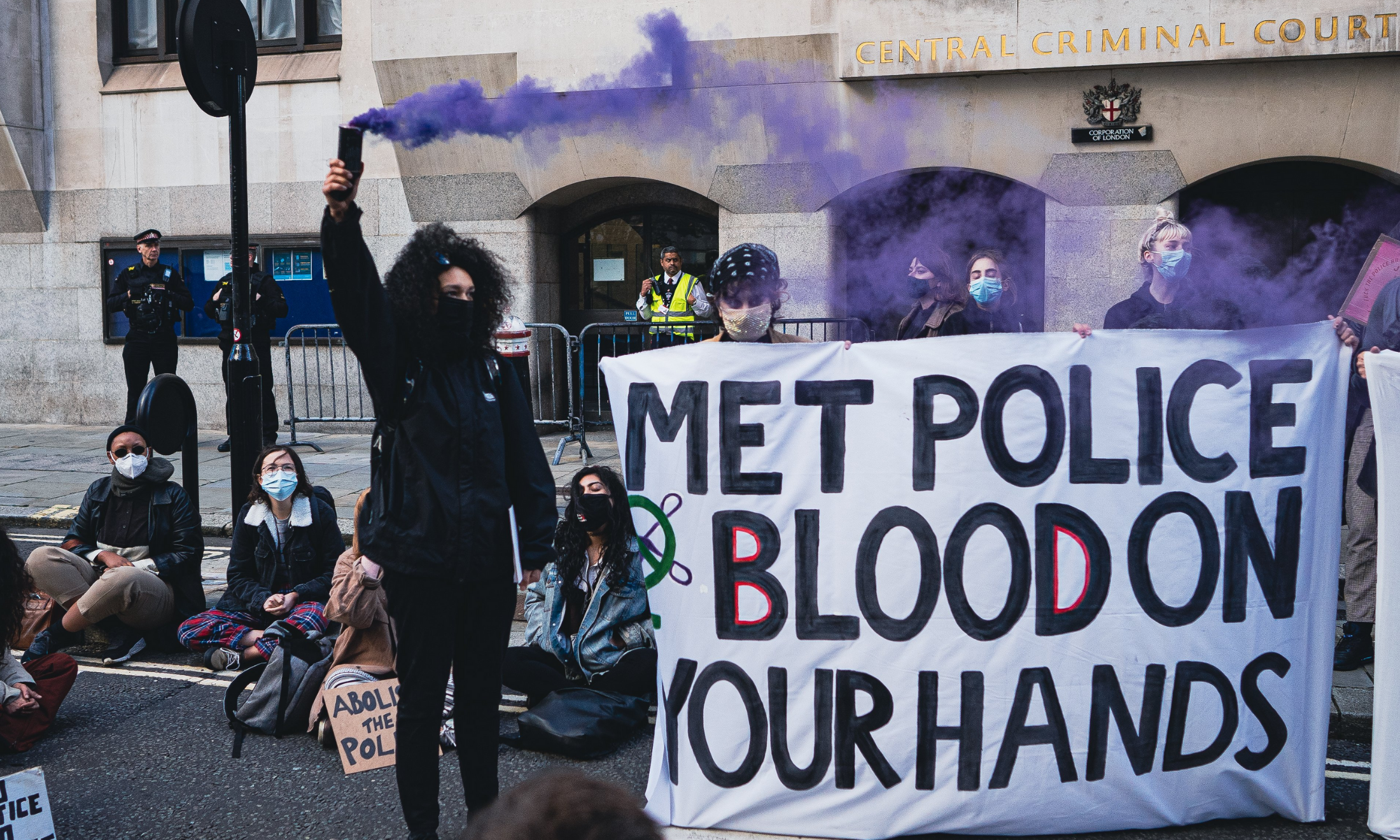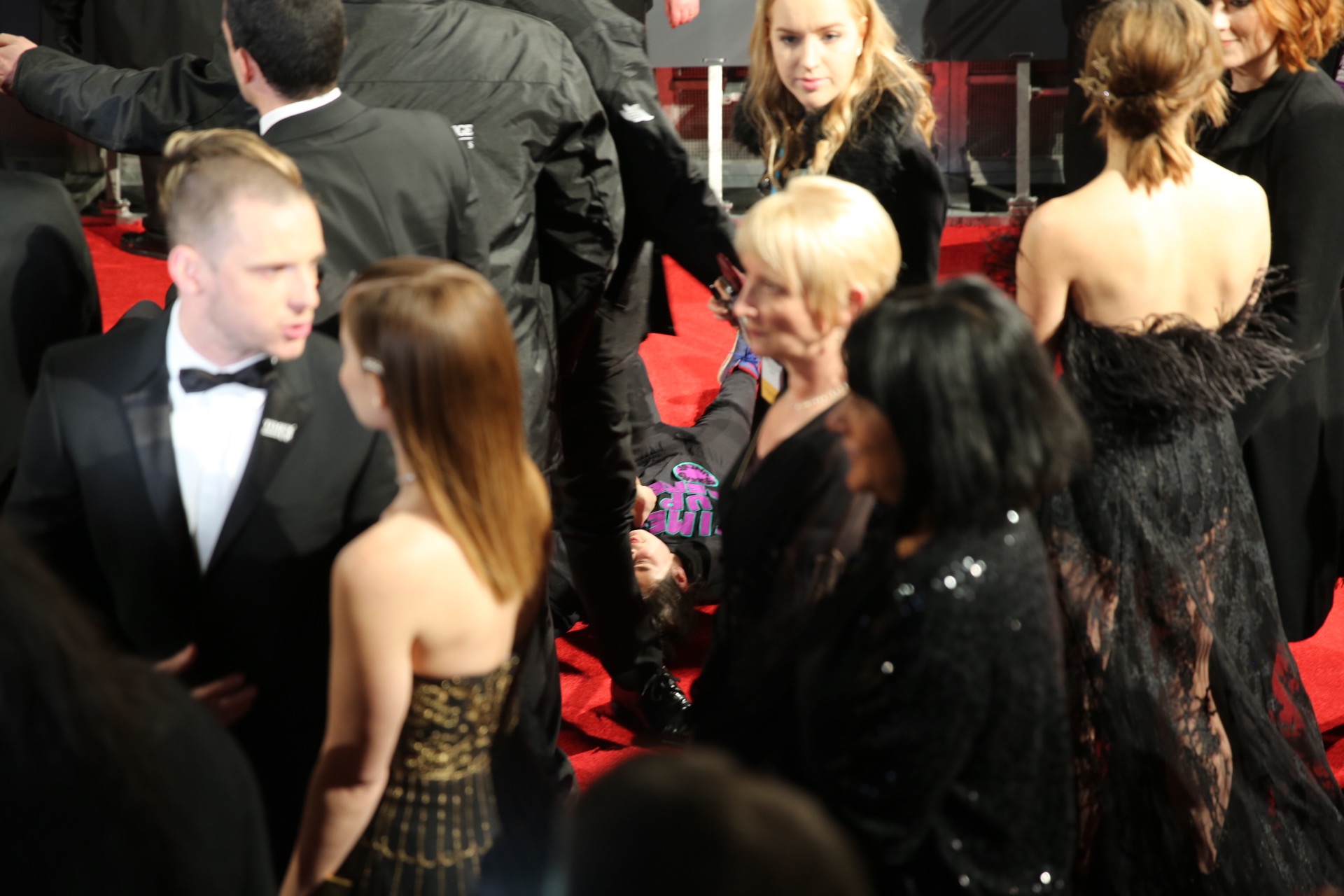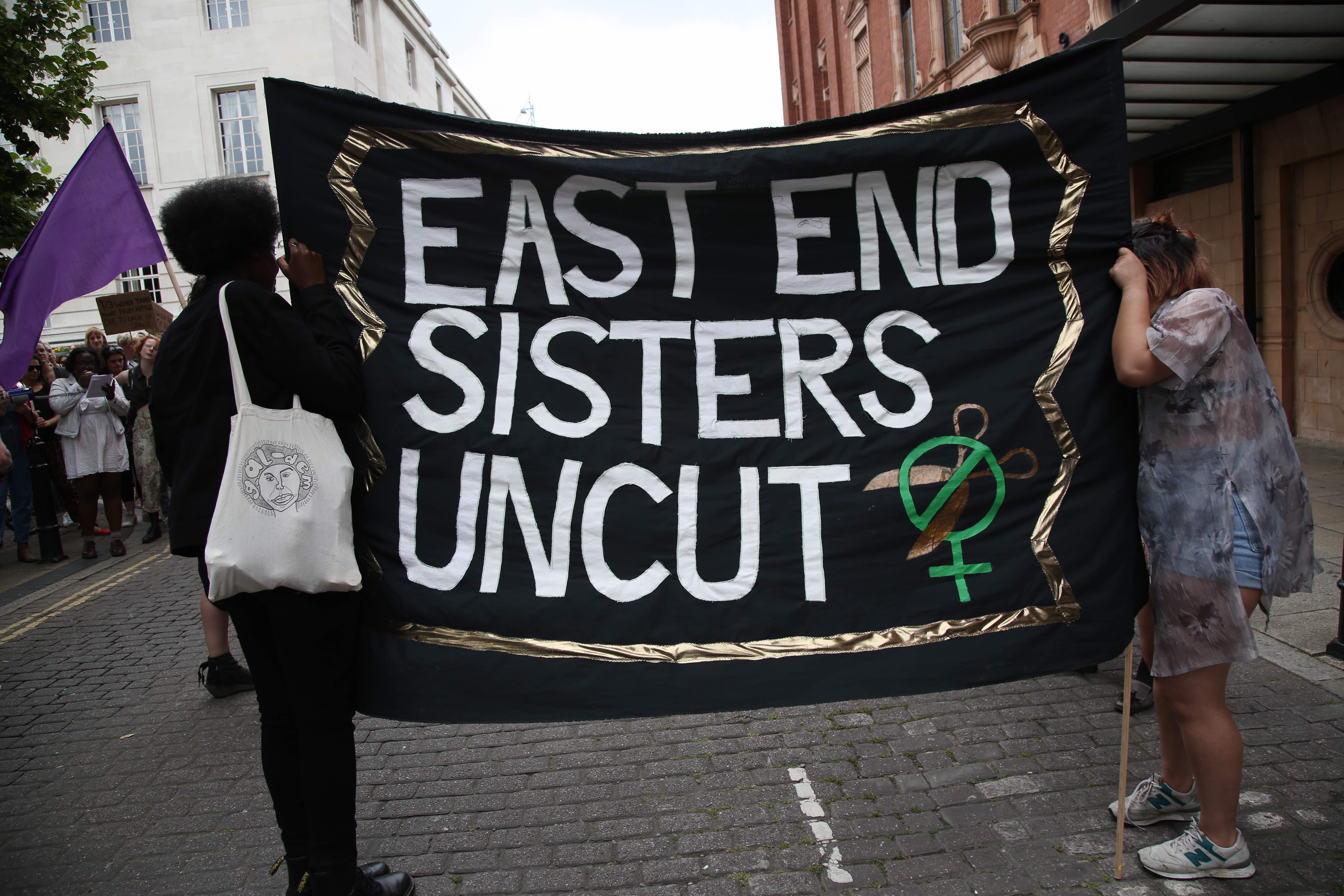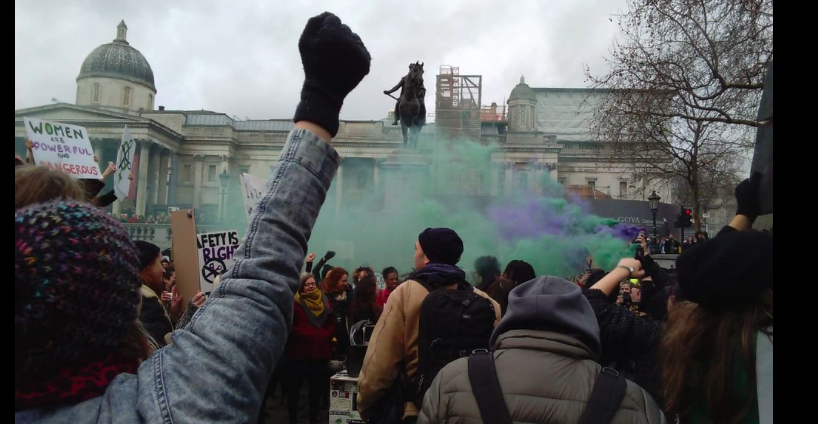A love letter to Sisters Uncut: Four members lift the lid on what makes the group so effective
After a successful campaign against the draconian police powers bill, four members of the feminist direct action group tell us how they got involved.
Sisters Uncut
22 Mar 2021

courtesy of Sisters Uncut
The feminist direct action group Sisters Uncut won a great victory last week: after organising five consecutive days of action since Saturday 13 March the police powers bill, which would have handed the police sweeping new powers to crack down on non-violent protest, was delayed until April.
This isn’t the first time the sisters have created tangible change. While they might be most famous for laying down on the red carpet of the Suffragette premiere in London, since their inception in 2014, “horrified” that domestic violence services were being decimated by austerity, they’ve seen through the Domestic Violence and Abuse Bill, organised countless protests and, notably, occupied Holloway Prison’s Visitor Centre, hosting a week-long community festival and pushing for the construction of a women’s centre. At the moment they have chapters in over ten regional areas of the UK and are mainly organising online to help prevent the spread of Covid-19.
But what is it that makes their direct action work effective? And why do so many women and people of marginalised genders join their ranks and fall in love? We spoke to four sisters to find out.
gal-dem: What do you love about Sisters Uncut?
Saskia*: Sisters spaces operate very differently than any other that I’ve been in. Something I thought at my first meeting, which I’ve heard echoed many times, is along the lines of, ‘Wow, I’ve never seen a group of people listen to each other like this before.’
Zoe*: We have a robust critique of systems of power: capitalism, racism, gendered violence. The group is made up of so many people with different skills: strategisers, graphic designers, welfare coordinators, people willing to risk arrest to challenge oppressive systems. We know that what we all contribute is different, and we genuinely want to organise as a collective where everyone’s views are equally valued.
Alhan*: The amount that I have learned from Sisters has been deeply formational to me. And I mean learning in many forms: from political learning in meetings or ‘Sisters Learn’ sessions where we deep dive into a specific topic; to practical learning around organising – what does it take to organise a meeting? What about a march? A red carpet storming action? All the way down to the personal level – how do you react to being around so many incredibly talented, knowledgeable, opinionated people? How do you deal with disagreements? What do you do when you’ve made a mistake?
Nik*: Underscoring all of our organising is deep ethics of care, the knowledge that care work produces and reproduces the workforce. We believe in and try to practice revolutionary love – understanding that we will fail each other in many different ways, but believing in our capacity to fight together and to act collectively.
Why did you decide to get involved?
Zoe: I got involved after the reclaiming of Holloway Prison Visitor’s Centre – I knew Sisters represented the future of feminist organising and wanted to be a part of the movement. The reclaimed space itself was such a beautiful environment, the demands to the council were so bold, it felt so radical and powerful to be part of.
In a way, it’s almost a neverending cycle – the longer I’ve been organising with Sisters, the more I learn. And whatever I learn confirms to me the urgency and necessity of the work we are doing – whether it’s from the professional experience of sector workers, the lived experience of survivors, of sisters or siblings whose identities exist at the intersection of multiple structures of power, or from the reaction of those in power to our demands.
Alhan: I got involved back in 2016, when East End Sisters Uncut reclaimed an empty council flat in Marian Court, Hackney. A friend took me along to the community day, which turned into an impromptu meeting and from that point on, I was hooked. I saw the power that collective demands can have and understood myself as part of the legacy of feminist organising that extends far back.
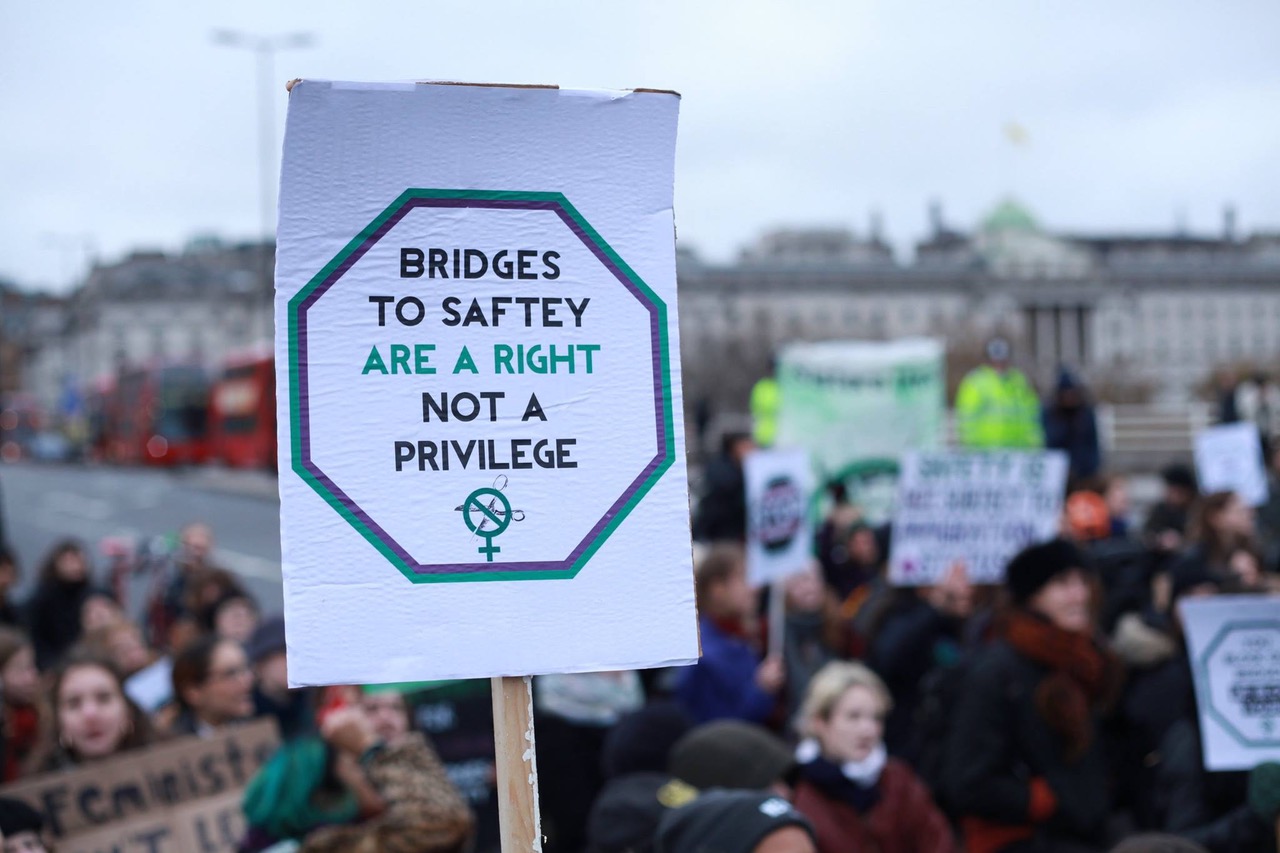
What direct action / campaign work are you most proud of doing with Sisters Uncut?
Saskia: There has been so much incredible work that has gone on since I’ve been involved with Sisters, it’s hard to choose. We’ve blocked roads and bridges prior to elections, highlighting austerity and its impact on survivors of gender-based violence. We occupied an empty council flat in Marian Court in 2016 for nine weeks to highlight the need for places of refuge for survivors of domestic violence and demand the council house survivors. This last week or so has made me incredibly proud – stepping up to claim our right to grieve and organise when faced with repression from the police, highlighting the links between patriarchal and police violence, and the need to defend our right to protest against them.
Nik: The work that we’ve done around the Holloway Prison site is also something that comes to mind now. Even before our week-long occupation of the visitor’s centre in 2017, we have been deeply invested in the story of Holloway. From the imprisonment of the suffragettes last century to the tragic death of Sarah Reed in 2016, the history of the site is deeply linked to misogynistic and racist state violence.
During its redevelopment, we continue to call on Peabody and Islington Council to commit to the construction of a Women’s Building completely separate from the criminal justice system. We want the site to be used for the provision of specialised services and community good, to begin to heal the trauma and violence that has been enacted on that site in the name of policing and the prison system.
What are your relationships like with the other sisters?
Zoe: The sheer number of us is one factor: sisters and siblings are powerful and dangerous and we’re everywhere, operating in loads of different spaces, in all different walks of life. As such, there’s a huge depth and breadth of relationships within Sisters Uncut. All of our relationships should be formed based on deep respect and love – we’re not a clique or a social group, we’re here to organise. Some of us are close friends, some of us roll with other folks, but we’re all comrades – we’re all here for each other. I’ve absolutely made lifelong personal friendships at Sisters, but everyone’s experience of building relationships in the space is different.
Alhan: It’s important to acknowledge here that sometimes they can also be challenging! It can be really intense organising around such sensitive and emotional issues. People get passionate, tensions can run high and emotions can boil over. But on a personal and a group level we try to heal together when communication breaks down, to work through issues, and always come through for one another.
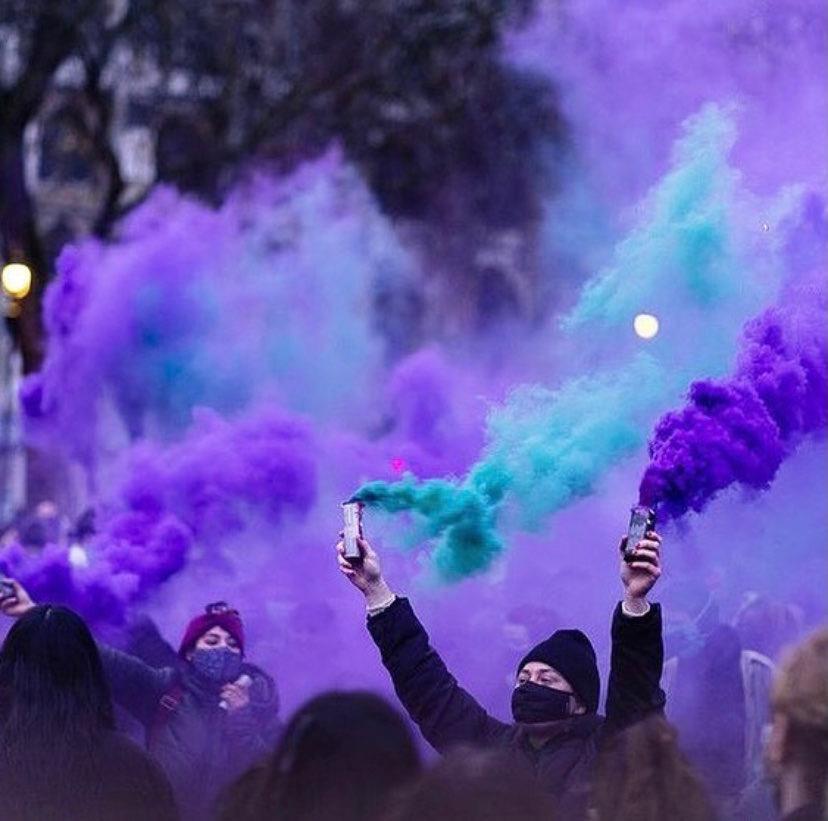
What do you think people should know about Sisters Uncut that they don’t already?
Saskia: You do not need to be qualified in any way to join us – you just need a belief that we could live differently. Also, our anonymity is key, though people might publicly identify themselves as Sisters or siblings, no one person represents us or our history. We act as a collective because it is important that we are not personally identifiable when challenging the state. The stakes are high.
Nik: Hopefully people know this, but it always bears repeating – difference underpins our organising. Our identities as Sisters and siblings exist at multiple intersections of power: We are women (yes, we mean ALL women – trans, intersex, and cis), non-binary and gender-variant people. Black sisters and siblings, sisters of colour, working-class sisters, immigrant sisters, disabled sisters – we are all here organising together.
We’ve been around for seven years now, and we are still learning and growing all the time, but with ever deeper foundational knowledge and experience. We don’t presume to know everything, and you don’t need to know everything either to get involved. We learn and grow together. As long as you come to Sisters spaces willing to put in the work, with an open mind, an ability to take (and give) criticism, and a desire to learn – then you are more than welcome.
*Names have been changed to protect identities
For those experiencing domestic violence and in need of support, the Domestic Abuse Hotline runs 24 hours a day and can be reached at 0808 2000 247.
The national sexual abuse support helpline remains open every day from 12-2:30pm and 7-9:30pm and can be reached on 0808 802 9999.

Britain’s policing was built on racism. Abolition is unavoidable

How Pakistan’s Khwaja Sira and transgender communities are fearing and fighting for their futures

Their anti-rape performance went viral globally. Now what?


